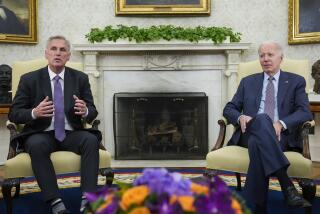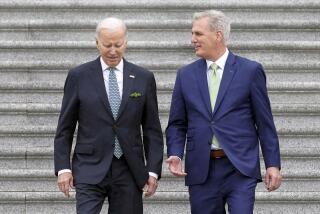Nitty-gritty on healthcare reform: Key players
Though Democrats control the House of Representatives, they have not united around any one proposal. They also face opposition from conservative Republicans on several key points:
Speaker Nancy Pelosi has said there aren’t enough votes to pass healthcare reform unless it contains a robust public option, one that is stronger than Senate Democrats favor. “There’s no way I can pass a bill without a public option,” the California Democrat said.
Important to watch are Reps. Raul M. Grijalva (D-Arizona) and Keith Ellison (D- Minn.), co-chairs of the Congressional Progressive Caucus, which backs a strong public option. In a recent letter signed by 60 lawmakers, the group demanded that a public option be included in any bill.
Pelosi’s principal deputy, House Majority Leader Steny Hoyer (D-Md.) also backs a public option, but his enthusiasm seems tempered by the political realities in his chamber and in the Senate.
“I’m for a public option, but I’m also for passing a bill,” Hoyer told reporters recently. “We believe the public option is a necessary, useful and very important aspect of this, but, you know, we’ll have to see, because there are many other important aspects of the bill as well.”
There is also heat from the right. The Democratic Blue Dog Coalition, so named by moderates and conservatives who have long felt shut out of the party by their more liberal colleagues, forced changes in the bill as it worked its way through the Energy and Commerce Committee. Rep. Dennis Cardoza (D-Calif.) and Blue Dog Coalition Co-Chairman Charlie Melancon (D-La.) were among the key negotiators and will be involved in the final shaping of the bill.
If Democrats are split, Republicans are more united in the House. They argue that healthcare reform is too expensive, will require sizable tax increases and cuts in services (“rationing”) while opening the door to a greater role by government in determining treatments for individuals.
Those arguments will likely carry more weight in the Senate, where Democrats outnumber Republicans 60 to 40. But there are those who are wavering, including Sens. Ben Nelson (D-Neb.), Mary Landrieu (D-La.) and Ron Wyden (D-Ore.). Independent Joe Lieberman (Conn.), who caucuses with the Democrats, is among those who are prepared to vote against a strong public option, giving the GOP some leverage if Senate leaders want to avoid a filibuster fight.
Negotiations are ongoing among the so-called Gang of Six trying to get a bipartisan bill. The bargainers include Finance Chairman Max Baucus (D-Mont.), two conservative Republicans, Sens. Charles Grassley (Iowa) and Mike Enzi (Wyo.), moderate Sen. Olympia Snowe (R-Maine) and Democratic Sens. Jeff Bingaman (D-N.M.) and Kent Conrad (D-N.D.) round out the group.
It is Conrad who has been pushing the idea of a co-op as a way of getting a public role that would circumvent the political land mine of a government-run insurance program. That idea also was being pushed by former Senate Majority Leader Tom Daschle, who with former Senate Republican leaders Bob Dole and Howard H. Baker Jr. have been trying to craft a bipartisan compromise. Daschle was forced to withdraw as Obama’s health czar because of tax problems. A lobbyist, he remains a close advisor to the president.
More to Read
Sign up for Essential California
The most important California stories and recommendations in your inbox every morning.
You may occasionally receive promotional content from the Los Angeles Times.











